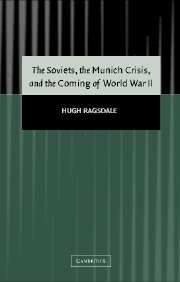Book contents
- Frontmatter
- Contents
- List of Maps
- Acknowledgments
- List of Abbreviations
- Foreword
- Preface: A Test Case of Collective Security
- Introduction: The Nature of the Problem
- Part One Background of the Munich Crisis
- Part Two Foreground: Climax of the Crisis
- Part Three Conclusion
- 7 What the Red Army Actually Did
- 8 What the Red Army Might Feasibly Have Done
- 9 Epilogue
- 10 Assessment of Soviet Intentions
- Appendices
- Index
10 - Assessment of Soviet Intentions
from Part Three - Conclusion
Published online by Cambridge University Press: 07 September 2010
- Frontmatter
- Contents
- List of Maps
- Acknowledgments
- List of Abbreviations
- Foreword
- Preface: A Test Case of Collective Security
- Introduction: The Nature of the Problem
- Part One Background of the Munich Crisis
- Part Two Foreground: Climax of the Crisis
- Part Three Conclusion
- 7 What the Red Army Actually Did
- 8 What the Red Army Might Feasibly Have Done
- 9 Epilogue
- 10 Assessment of Soviet Intentions
- Appendices
- Index
Summary
Now, what is most significant in this story for the assessment of Soviet intentions?
First there is the serious evidence of Litvinov's working – and thinking how – to avoid war altogether, explaining that war was not in the Soviet interest. We have not found him trying to provoke Lenin's conception of an imperialist war among the capitalist powers. Thus he told William Bullitt on the remilitarization of the Rhineland that he hoped that France would not march troops into the Rhineland, because it would mean immediate war. He wrote home from Geneva on 23 September 1938 to suggest that Soviet mobilization – he was presumably ignorant of the substantial but unannounced partial mobilization of the preceding two days – might even then deflect Hitler from starting a war. His consistently avowed objective, in private communications such as these, not to speak of his public speeches, was to save the peace. He had earlier informed Aleksandrovskii that Moscow was willing to countenance any reasonable measures of compromise in the Sudeten conflict that would both save the peace and leave Czechoslovakia free and independent.
What was the nature of Moscow's commitment to Czechoslovakia? In early August 1938, Litvinov instructed Aleksandrovskii that Moscow's interest in Czechoslovakia consisted in blocking Hitler's drive to the southeast. A couple of weeks later, he told the German ambassador, Count von der Schulenburg, that the Sudeten issue was for Moscow strictly a question of power politics, of balance of power, that, as he had also told the French correspondent of Le Temps, Moscow had no interest in defending Versailles, to which it was not a party: It had always favored self-determination of peoples, and its attitude to the Sudeten issue would have been quite different if the democratic Weimar regime still governed Germany.
- Type
- Chapter
- Information
- The Soviets, the Munich Crisis, and the Coming of World War II , pp. 182 - 192Publisher: Cambridge University PressPrint publication year: 2004



